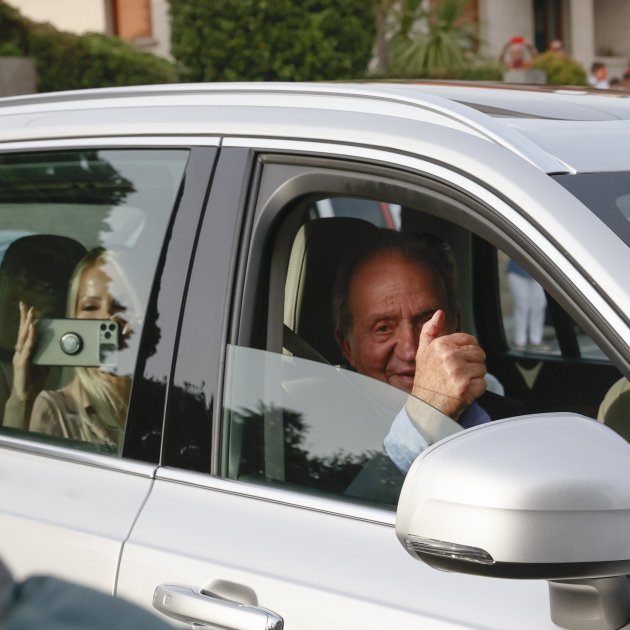The newspapers of Europe and the United States paint a very different portrait of the return of Spain's former king Juan Carlos I from that presented in most of the Spanish press. None of the international newspapers dedicate their space to what Spanish readers are being fed: extensive reports on minor details such as the house in the town of Sanxenxo where the king emeritus spent the night; no-one north of the Pyrenees has interviewed Pedro Campos, the friend who received the abdicated monarch at Vigo airport; and none of them place much importance on whether or not he seems to be in a reasonable state of health.
What they do focus on is the question of whether this return is normal, whether it could have consequences for the current monarchy of Felipe VI and, above all, why the man who was Spain's head of state for 39 years has not yet given an explanation more than 21 months after leaving secretly for the United Arab Emirates. Another fact on which all the international headlines examined coincide is that, although in the end he avoided any consequences from the Swiss judiciary, he has been engulfed in corruption and his eventual regularization of his situation with the Spanish treasury, through express payments of back-taxes shows that he did not comply with the law.
"Visit makes his subjects wince"
There is no shortage of devastating phrases among the foreign reports. "Juan Carlos's Spanish visit makes his former subjects wince," headlines the French newspaper Le Figaro. The journalist Mathieu de Taillac adds that "the voyage of the king emeritus of Spain, who has been based in Abu Dhabi since August 2020, is nothing like a quiet getaway." And he is amazed at how the television networks dedicate hours to the live broadcast of his arrival. Juan Carlos is - as Le Figaro calls him three times - "a runaway king."
The French weekly L'Express speaks of a similar emotion, but even stronger: "Juan Carlos I arrives in Spain, a brief visit that makes people cringe." A concept, close to horror, which has also been picked up by Le Monde television news. And this media expresses surprise at how the Spanish judiciary "has been unable to prosecute him due to the lack of incriminating evidence, the prescription of crimes and the immunity he enjoyed as head of state until 2014." But it also recalls that he brings with him a resumé containing "many tax irregularities of which the former king had been guilty and which led him to make two tax adjustments worth more than 5 million euros."
"Background of scandals"
Swiss French-language daily Tribune de Genève recalls that in 2014 when Juan Carlos abdicated it was "amidst scandals". And also from Switzerland, the German-language Blick points out that he escaped justice due to his privileges, in no way for not having committed fraud: "The ex-monarch, who was once highly revered by many Spaniards, only narrowly escaped criminal proceedings. The prosecution only dropped the years-long investigation into financial irregularities in March because Juan Carlos was either protected by his immunity as king until his abdication in 2014, the actions were statute-barred or he hastily paid back taxes worth millions."
The European edition of the American newspaper Politico states that Juan Carlos I is a heavy burden for the Bourbons royal family, still today: "Felipe has not been able to prevent Juan Carlos’ personal fall from grace from eroding the crown’s image, particularly among younger voters who have no memory of the former king’s achievements. A 2021 poll found that 31 percent of those asked were in favor of the monarchy and 39 percent in favor of a republic." And it adds: "This has placed the monarchy, unwittingly, in the political arena, making it yet another cause of division between left and right."
Meanwhile, the Washington Post highlights the monarch's irregularities: "Although Juan Carlos was not among the main subjects of the Swiss probe, prosecutors there said they discovered he received $100 million from the Saudi finance ministry in 2008 before he stepped down as king. The investigation also turned up millions more received by the king or his former partner, Danish-German entrepreneur Corinna Larsen."
"An uncomfortable guest"
Other newspapers, such as Le Républicain Lorrain, point out that "according to Spanish media, the government of Socialist Pedro Sánchez was, in fact, fiercely opposed to the fact that he could be accommodated in the Zarzuela palace, the official residence of the sovereign, who is the head of state." And Germany's FrankenPost is also quite explicit: "Juan Carlos I, an uncomfortable guest for his country." The article begins: "In dry language, the Spanish royal family announced the return of former monarch Juan Carlos. The first visit of the old king is a balancing act for the monarchy."
And the Irish Times links to the ex-king's corruption in its headline: "Former Spanish king returns from self-exile for visit after financial scandal." And in Sanxenxo: "This weekend, the town is at the centre of a furious debate over the country’s monarchy." "But father and son are due to meet in Madrid on Monday, before Juan Carlos flies back to his refuge in the Gulf. While it could be an opportunity to mend their relationship, repairing the monarchy’s prestige will be a much more daunting task."
